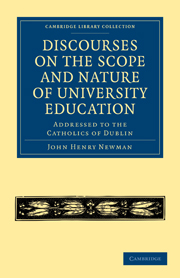Book contents
- Frontmatter
- PREFACE
- Contents
- CORRIGENDA
- Discourse I Introduction
- Discourse II Theology a Branch of Knowledge
- Discourse III Bearing of Theology on other Branches of Knowledge
- Discourse IV Bearing of other Branches of Knowledge on Theology
- Discourse V General Knowledge viewed as One Philosophy
- Discourse VI Philosophical Knowledge its own end
- Discourse VII Philosophical Knowledge viewed in relation to Mental Acquirements
- Discourse VIII Philosophical Knowledge viewed in relation to Professional
- Discourse IX Philosophical Knowledge viewed in relation to Religion
- Discourse X Duties of the Church towards Philosophy
- Appendix
Discourse II - Theology a Branch of Knowledge
Published online by Cambridge University Press: 05 July 2011
- Frontmatter
- PREFACE
- Contents
- CORRIGENDA
- Discourse I Introduction
- Discourse II Theology a Branch of Knowledge
- Discourse III Bearing of Theology on other Branches of Knowledge
- Discourse IV Bearing of other Branches of Knowledge on Theology
- Discourse V General Knowledge viewed as One Philosophy
- Discourse VI Philosophical Knowledge its own end
- Discourse VII Philosophical Knowledge viewed in relation to Mental Acquirements
- Discourse VIII Philosophical Knowledge viewed in relation to Professional
- Discourse IX Philosophical Knowledge viewed in relation to Religion
- Discourse X Duties of the Church towards Philosophy
- Appendix
Summary
Great as are the secular benefits ascribed by the philosopher of the day to the present remarkable reception in so many countries of the theory of Private Judgment, it is not without its political drawbacks, which the statesman at least, whatever be his predilections for Protestantism, cannot in candour refuse to admit. If it has stimulated the activity of the intellect in those nations which have surrendered themselves to its influence, on the other hand it has provided no sufficient safeguards against that activity preying on itself. This inconvenience indeed matters comparatively little to the man of letters, who often has no end in view beyond mental activity itself, of whatever description, and has before now even laid it down, as the rule of his philosophy, that the good of man consists, not in the possession of truth, but in an interminable search after it. But it is otherwise with those who are engaged in the business of life, who have work and responsibility, who have measures to cany through and objects to accomplish, who only see what is before them, recognize what is tangible, and reverence what succeeds. The statesman especially, who has to win, to attach, to reconcile, to secure, to govern, looks for one thing more than any thing else—how he may do his work with least trouble, how he may best persuade the wheels of the political machine to go smoothly, silently, and steadily; and with this prime desideratum nothing interferes so seriously as that indefinite multiplication of opinions and wills which it is the boast of Protestantism to have introduced.
- Type
- Chapter
- Information
- Discourses on the Scope and Nature of University EducationAddressed to the Catholics of Dublin, pp. 35 - 66Publisher: Cambridge University PressPrint publication year: 2010First published in: 1852

